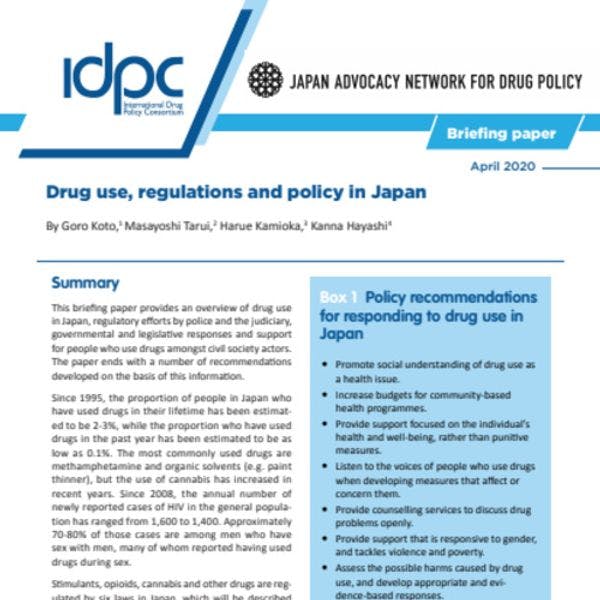Drug use, regulations and policy in Japan
By Goro Koto,1 Masayoshi Tarui,2 Harue Kamioka,3 Kanna Hayashi4
1. Japan Advocacy Network for Drug Policy
2. Keio University, Tokyo, Japan
3. Japan Advocacy Network for Drug Policy & Women’s DARC
4. Faculty of Health Sciences, Simon Fraser University, British Columbia, Canada
This briefing paper provides an overview of drug use in Japan, regulatory efforts by police and the judiciary, governmental and legislative responses and support for people who use drugs amongst civil society actors. The paper ends with a number of recommendations developed on the basis of this information.
Since 1995, the proportion of people in Japan who have used drugs in their lifetime has been estimated to be 2-3%, while the proportion who have used drugs in the past year has been estimated to be as low as 0.1%. The most commonly used drugs are methamphetamine and organic solvents (e.g. paint thinner), but the use of cannabis has increased in recent years. Since 2008, the annual number of newly reported cases of HIV in the general population has ranged from 1,600 to 1,400. Approximately 70-80% of those cases are among men who have sex with men, many of whom reported having used drugs during sex.
Stimulants, opioids, cannabis and other drugs are regulated by six laws in Japan, which will be described in detail below. These laws impose severe penalties for all activities associated with the illicit drug trade, with the maximum penalty for drug offences being life imprisonment. As a result, 14,019 people were arrested for drug offences in 2017 alone. Of those, 73% involved methamphetamine, with personal use and possession accounting for 90%. The proportion of repeat offenders, accounting for two thirds of arrests, has recently increased while the overall number of arrestees and first-time offenders fell. The application of severe penalties against drug offenders has led to a large proportion of the prison population being incarcerated for drug offences – in 2017, 27.7% of new male prisoners and 36.7% of new female prisoners were imprisoned for methamphetamine-related offences. While alternatives to incarceration do exist, including a system of suspended sentences es- tablished in 2016, the overall response remains puni- tive in nature.
Unsurprisingly, in Japan, drug use is viewed chiefly as a criminal matter, with emphasis placed on its eradication through intolerance and punishment. The Japanese government’s drug policy is described in its Five-Year Drug Abuse Prevention Strategy. That strategy focuses on education and public awareness, treatment and reintegration of people who use drugs, crackdowns on drug dealers and users, prevention of smuggling and international cooperation. The government’s support for people who use drugs, however, remains inadequate. While the government has finally recognised the effectiveness of harm reduction in other countries at international meetings, it opposes its introduction in Japan and has expressed opposition to the inclusion of harm reduction approaches in UN recommendations on drug policy. Support for drug dependence in the community is largely left to self-help groups, with limited support from medical institutions. Although advocacy for the health and human rights of people who use drugs has been gaining ground over the past decade, led by people with lived experience, their family and their supporters, a view to understanding drug use as a health issue is lacking, and it has become crucial to improve the provision of social support for people who use drugs and respect for their human rights.
Downloads
Topics
Regions
Related Profiles
- International Drug Policy Consortium (IDPC)
